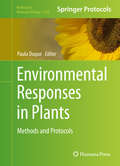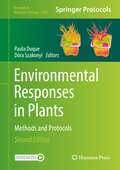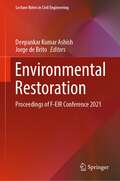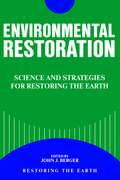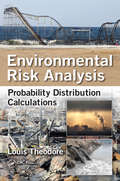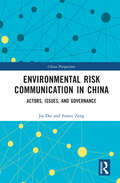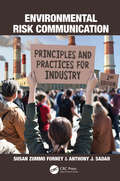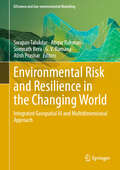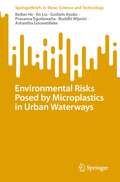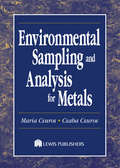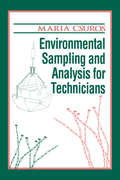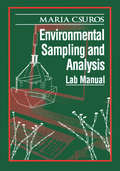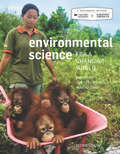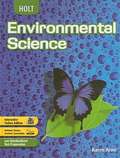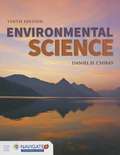- Table View
- List View
Environmental Responses in Plants
by Paula DuqueThis volume describes different up-to-date methodological approaches, ranging from physiological assays to imaging and molecular techniques, to study a wide variety of plant responses to environmental cues. Environmental Responses in Plants: Methods and Protocols is divided into four sections: Tropisms, Photoperiodism and Circadian Rhythms, Abiotic Stress Responses, and Plant-Pathogen Interactions. The chapters in these sections include detailed protocols to investigate some of the many key biological processes underlying plant environmental responses, mostly in the model organism Arabidopsis thaliana, but also in Physcomitrella patens and in different crop species such as rice, potato, barley, or tomato. Written in the highly successful Methods in Molecular Biology series format, chapters include introductions to their respective topics, lists of the necessary materials and reagents, step-by-step, readily reproducible laboratory protocols, and tips on troubleshooting and avoiding known pitfalls. Authoritative and practical, Environmental Responses in Plants: Methods and Protocols, is a great resource for plant physiologists, biochemists, and cell and molecular scientists interested in this exciting and fast-growing research topic.
Environmental Responses in Plants: Methods and Protocols (Methods in Molecular Biology #2494)
by Paula Duque Dóra SzakonyiThis second edition describes up-to-date methodological approaches, ranging from physiological assays to imaging and molecular techniques, to study a wide variety of plant responses to environmental cues. Chapters are divided into four sections detailing protocols to investigate key biological processes underlying plant environmental responses in the model organisms Arabidopsis thaliana and Physcomitrella patens as well as in different crop species. Written in the format of the highly successful Methods in Molecular Biology series, each chapter includes an introduction to the topic, lists necessary materials and reagents, includes tips on troubleshooting and known pitfalls, and step-by-step, readily reproducible protocols. Authoritative and cutting-edge, Environmental Responses in Plants, Second Edition aims to be a foundation for future studies and to be a source of inspiration for new investigations in the field.
Environmental Restoration: Proceedings of F-EIR Conference 2021 (Lecture Notes in Civil Engineering #232)
by Jorge De Brito Deepankar Kumar AshishThis book gathers peer-reviewed contributions presented at the F-EIR Conference 2021, Environment Concerns and its Remediation, held in Chandigarh, India, on October 18-22, 2021. The respective papers focus on environmental monitoring and remediation, and cover topics such as efficiency in the use of energy, water, resources and human capital, waste minimization & management, durability and sustainability of building materials, green technologies, environmental sustainability and resilience, renewable energy, prevention and management of water pollution, life cycle assessment, and climate change. Accordingly, the book offers a valuable, up-to-date tool and essential overview of the subject for scientists and practitioners alike, and will inspire further investigations and research.
Environmental Restoration: Science And Strategies For Restoring The Earth
by John BergerEnvironmental Restoration is the product of a ground-breaking conference on ecological restoration, held in January 1988 at the University of California, Berkeley. It offers an overview from the nation's leading experts of the most current techniques of restoration, including examples of the complex and subtle biological interactions we must understand to ensure success.Chapters cover restoration of agricultural lands, barrens, coastal ecosystems, prairies, and range lands. Additional sections address temperate forests and watersheds, mined lands, soil bioengineering, urban issues including waste treatment and solid, toxic, and radioactive waste management. The book also covers restoration of aquatic systems, includes chapters on strategic planning and land acquisition, and provides examples of successful projects.
Environmental Rights: Critical Perspectives (Esri Working Papers In Policy Studies)
by Chris MillerEnvironmental Rights offers new perspectives on contemporary debates over rights and environmental issues. It draws on key theories of contemporary philosophers and jurists and case reports from decisions in English, European and US courts. It also examines recent developments within environmental law and policy in the UK and the EU. Specific rights of the individual are examined - the right to clean air and water, access to information, the right to participate in environmental decisions - as well as the practical obstacles to the exercising of these rights.
Environmental Risk Analysis: Probability Distribution Calculations
by Louis TheodoreA Training Tool for the Environmental Risk ProfessionalEnvironmental Risk Analysis: Probability Distribution Calculations defines the role that probability distributions play in risk analysis, and gives direction on how to measure and compare the magnitude of risk more efficiently. Designed for the practicing environmental engineer and scientist, t
Environmental Risk Communication in China: Actors, Issues and Governance (China Perspectives)
by Jia Dai Fanxu ZengThe role of media is becoming increasingly important as globalization has developed. Given fast social transformation and technological development in China, the consequent environmental and health risks demand citizens integrate the communication and prevention of such risks as a significant part of their daily life. This book systematically discusses the communication process of typical environmental risk issues, and the complex interaction among multiple actors, including the public, media, experts, non-governmental organizations, and government in contemporary China. From a media-centered perspective, it applies major theories in the field of enviornmental and risk communication, and uses a variety of empirical research methods to unravel the complicated and unique experience of communication and governance. Combining theoretical reflections with real-life examples of Chinese scenarios, the authors not only encourage a dialogue between Western and Chinese academia but also inspire students and practitioners to apply risk communication theories to solving real-life problems. The book will appeal to students, scholars, and practitioners of risk and environmental communication studies.
Environmental Risk Communication: Principles and Practices for Industry
by Susan Zummo Forney Anthony J. SadarModern industry faces many communication challenges, including social media. The second edition of this book is thoroughly updated, expanded, and reorganized to help industry communicators remain effective in addressing these challenges. At the core of this book are foundational building blocks that address the human factors responsible for driving success or failure when communicating about environmental risk. Features Provides principled guidance for building relationships and engaging in constructive dialogue with stakeholders. Offers straight talk and practical, easy-to-follow guidance on effective risk communication for various situations, stakeholders, and modes of communication. Gives lessons learned from environmental permitting and crisis situations involving risk communication in various industries, including chemical manufacturing, waste management, and the energy sector. Addresses nuanced, recent concerns regarding issues like fake news and social media bullying. Examines the dos and don’ts of communicating effectively during tough conditions like environmental emergencies. Environmental Risk Communication: Principles and Practices for Industry is intended to be both a grounding in enduring principles and a continued resource for best approaches and techniques. Coupled with tools and best practices from decades of experience, this insider’s guide provides CEOs, plant managers, environmental compliance professionals, health and safety officers, and others with the direction and the confidence needed to prepare for difficult dialogue and high-pressure encounters.
Environmental Risk and Resilience in the Changing World: Integrated Geospatial AI and Multidimensional Approach (GIScience and Geo-environmental Modelling)
by Atiqur Rahman Swapan Talukdar Somnath Bera G. V. Ramana Atish PrasharThis book provides huge knowledge and data in the fields of geospatial sciences, earth environmental sciences, humanities, and social sciences, which target a diverse range of readers, such as academics, scientists, students, environmentalists, meteorologists, urban planners, remote sensing, and GIS experts. Earth environment (ecological envelope of geosphere, biosphere, hydrosphere, atmosphere and cryosphere) faces a significant challenge from different risks and threats due to due to rapid changes in global land use, population increase and pollution. They might drastically impair the ecosystem's ability to maintain long-term service levels while bolstering the economic, social, and environmental pillars of sustainable development. Therefore, risk assessment (RA) has lately become a prominent research topic and a powerful mechanism for enforcing legal activities-related environmental restoration and health improvements to do sustainable development. The United States Environmental Protection Agency (USEPA) first used the risk assessment approach in 1980, and since then, it has expanded and become standard practice in many areas of ecological research. Some practices are air quality assessment, land degradation assessment, natural hazards risk assessment, urban surface ecological health condition, wetland and forest health assessment and drinking water quality assessment. However, recently risk assessment alone is not sufficient to propose any sustainable management plans. Also, there is no universal strategy for conducting risk assessments, and insufficient expertise with the methodology may result in erroneous findings. Therefore, scientists are increasingly interested in developing resilience strategies with AI and geospatial-based risk assessment to lower environmental risk. Different resilience approaches make different assumptions about the system dynamics involved in resilience-based environmental risk and impact assessment. Therefore, this book seeks to showcase the most current advances in risk and hazards assessment of environments with resilience strategies to mitigate the prevailing environmental issues with the help of remote sensing, GIS, artificial intelligence, and state-of-the-art frameworks like PSR, VIOR, nature-based solutions.
Environmental Risks Posed by Microplastics in Urban Waterways (SpringerBriefs in Water Science and Technology)
by An Liu Ashantha Goonetilleke Prasanna Egodawatta Buddhi Wijesiri Beibei He Godwin AyokoThis book presents comprehensive knowledge regarding the spatial and temporal distributions, influential factors, interactions with coexisting contaminants, migration behavior, and environmental risk posed by microplastics (MPs) in urban waterways. It provides a novel theoretical approach for the combined risks from MPs and coexisting contaminants, and advanced three-dimensional modeling techniques for different MPs’ dispersal and transport behaviors in urban waterways. Additionally, this book presents a scientifically robust investigation on the correlations between various influential factors and heterogeneity in relation to MP presence in river systems. The new knowledge presented would be of particular interest to readers such as urban water management professionals, urban plastic waste regulators, decision-makers, urban planners, and water environment quality model developers, as it provides practical solutions and recommendations for plastic-polluted river quality improvement from a risk management perspective.
Environmental Sampling and Analysis for Metals
by Maria Csuros Csaba CsurosDetermination of metals is a major part of the work of environmental testing laboratories. EPA and DEP methodology releases provide information only for selected areas of metals sampling and analysis, and their language makes them unsuitable for teaching and training purposes. Environmental Sampling and Analysis for Metals is a comprehensive and easy-to-read text for laboratory technicians and analytical chemists who need a guide for analyzing metals in environmental samples and a reference for analytical and quality control procedures.The book provides both theoretical and practical applications in metals analysis of environmental samples and incorporates the latest in analytical techniques, instrumentation, and regulations. Topics include sample collection, preservation, step-by-step analytical procedures, complete QA/QC requirements, data validation, and more. It also provides an overview of the occurrence, source, and fate of metallic substances in the environment, as well as their control by regulations and standards. Furthermore, the authors provide guidelines to help you prepare and understand reports. The analytical methods presented in Environmental Sampling and Analysis for Metals will be useful to anyone who produces, uses, or evaluates analytical data, and will be a valuable tool in environmental education and training programs.
Environmental Sampling and Analysis for Technicians
by Maria CsurosThis book provides the basic knowledge in sample collection, field and laboratory quality assurance/quality control (QA/QC), sample custody, regulations and standards of environmental pollutants. The text covers sample collection, preservation, handling, detailed field activities, and sample custody. It provides an overview of the occurrence, source, and fate of toxic pollutants, as well as their control by regulations and standards. Environmental Sampling and Analysis for Technicians is an excellent introductory text for laboratory training classes, namely those teaching inorganic nonmetals, metals, and trace organic pollutants and their detection in environmental samples.
Environmental Sampling and Analysis: A Practical Guide
by LawrenceH. KeithThis concise book covers all the critical aspects of environmental sampling and analysis. Extensively peer-reviewed by scientists from the U.S. Environmental Protection Agency and other government agencies, industry and academia, it is packed with practical advice and tips from renowned experts.Planning, sampling, analysis, QA/QC, and reporting are discussed for air, water, solid liquid, and biological samples, with emphasis on the interdependence between sampling and analytical activities. Special requirements for sampling devices, containers, and preservatives are provided with convenient checklists for sampling plans and protocols.New and revised recommendations involving method detection levels, reliable detection levels, and levels of quantitation are discussed in conjunction with laboratory reports and user presentations of data near analytical detection limits.This is a valuable and comprehensive reference book for chemists, technicians, consultants, lawyers, regulators, engineers, quality control officers, news and information managers, teachers, and students.
Environmental Sampling and Analysis: Lab Manual
by Maria CsurosThis manual covers the latest laboratory techniques, state-of-the-art instrumentation, laboratory safety, and quality assurance and quality control requirements. In addition to complete coverage of laboratory techniques, it also provides an introduction to the inorganic nonmetallic constituents in environmental samples, their chemistry, and their control by regulations and standards. Environmental Sampling and Analysis Laboratory Manual is perfect for college and graduate students learning laboratory practices, as well as consultants and regulators who make evaluations and quality control decisions. Anyone performing laboratory procedures in an environmental lab will appreciate this unique and valuable text.
Environmental Sampling for Unknowns
by Kathleen Hess-KosaEnvironmental Sampling for Unknowns covers modern approaches to indoor and outdoor environmental sampling, with an emphasis on identifying unknown substances.
Environmental Science
by D. Dubay A. Lapinski R. R. Schoch A. TweedA textbook on environmental science.
Environmental Science
by Andrew H. Lapinski Anne Tweed Robert M. SchochThe chapters in this book cover the following topics: Studying earth, Ecological interactions, Biomes, People in the global ecosystem, Energy resources, Resources in the biosphere, Managing human impact.
Environmental Science
by Anne Houtman Susan Karr Jeneen InterlandiFollowing real people and real science, Environmental Science for a Changing World provides a unique context for showing students how science works and how to think critically about environmental issues. Chapters don't merely include interesting stories--each chapter is an example of science journalism at its best, combining Scientific American-style writing, layout, and graphics to tell one compelling story that exemplifies important concepts and issues. This approach has proven so effective, that instructors using the book report a dramatic increase in the number of students who read the assignments and come to class ready to participate. This updated new edition features new stories, updated scientific coverage, and enhanced Infographics--the book's signature visual study tool that combines memorable images, step-by-step callouts, and now, questions that foster scientific literacy.
Environmental Science
by Kent Pryor Lissa Bainbridge-Smith Sarah Gaze Jill MellanbyThis fourth edition of BIOZONE’s Environmental Science combines the very best features of a light textbook with the utility of a workbook. This innovative hybrid, known as an interactive worktext, eliminates the need for a separate textbook, offering an all-in-one educational resource. It’s full color, highly visual content brings the subject to life in an engaging and thought- provoking manner. The four themes: Earth’s Systems, Living World, Global Resources, and Global Change introduce students to our planet’s physical and biological systems and the ways in which humans interact with them. This new edition includes engaging, real-world data on subjects relevant to students, such as fast fashion and mass travel. A chapter on climate change concludes the book and addresses the rapidly emerging and dynamic changes observed in the global environment. While many of the problems caused by human exploitation of Earth’s resources are highlighted, hope for the future features throughout via content that describes ways in which human induced issues can be mitigated.
Environmental Science
by Judy Braus Sara St. AntoineThis book covers the environmental sciences. It also focuses on skills that scientists use. These skills include asking questions, making predictions, designing experiments or procedures, collecting and organizing information, calculating data, making decisions, drawing conclusions, and exploring more options.
Environmental Science
by Karen ArmsIn reading Environmental Science, students not only learn a lot about science, they will learn about the complex issues facing our environment. They will explore different points of view and be exposed to a variety of differing opinions.
Environmental Science
by Michael J. PadillaThis hands-on content-rich program enables you to lead your students through explorations of specific concepts within Life, Earth, and Physical Science.
Environmental Science
by Prentice-Hall Staff WithgottTeaching environmental science is much more than just communicating facts and information. It's about engaging and motivating students. It's about helping them to better understand how and why their actions--and those around them--impact the world in which they live. <P><P> Environmental Science: Your World, Your Turn is a new high school program that brings the outside world into the classroom--making the science personal, actionable, and empowering for each student.
Environmental Science (Tenth Edition)
by Daniel D. ChirasProvides a comprehensive, student-friendly introduction to the environmental issues facing society today and offers numerous solutions for how we can create a more sustainable way of life.
